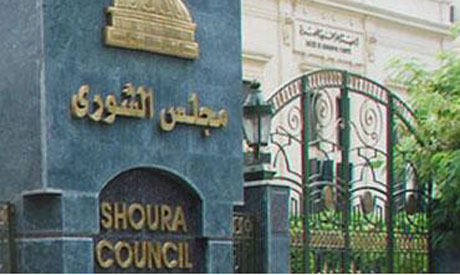
Neither a borrower nor a lender be (sufficiently Islamic), say some MPs (Photo: Al-Ahram)
Egyptian parliamentarians have renewed their attacks on government plans to take a $4.8 billion loan from the International Monetary Fund, with some Islamist figures claiming such borrowing is against religious law.
Speaking during a Wednesday afternoon sitting of Egypt's Upper House of Parliament, several MPs said an IMF loan would involve ursury, a practice forbidden by Islamic strictures.
They called for a 'fatwa' -- a religious ruling -- from Egypt's Office of Religious Edicts.
Leading the calls was Abdel-Halim El-Gammal from the Salafist Nour Party and head of the economic committee in the Upper House.
El-Gammal claimed that Egypt has untapped resources which could form an alternative to the controversial loan.
He suggested the country dip into its 'private funds'-- monies raised by state institutions through means other than customs or taxes, which were previously not incorporated into the general budget -- to lay hands on an extra LE40 billion.
Recalculating government inventories of goods and revising the high salaries of public officials appointed by the Mubarak regime could also release more than LE100 billion in extra funds, El-Gammal claimed.
Sayed Hozayen, an MP for the Muslim Brotherhood's Freedom and Justice Party's (FJP), used the Wednesday session to warn the government against subsidies cuts which could harm Egypt's poorest.
Egypt is required to submit economic reform plans to the IMF in order to secure funding. There is much speculation the programme will include slashing fuel and food subsidies.
Egypt's President Mohamed Morsi met in August with the IMF head Christine Lagarde to reach an agreement on a prospective loan which the country has been debating for over a year.
Progress on the loan was welcomed by Islamist politicians such as Saad El-Husseini, the former head of the budget and planning committee in the dissolved Lower House.
Saying that he completely supports the IMF loan, even if it entails what is considered usury, El-Husseini added that, in Sharia law, "necessities allow the forbidden."
Meanwhile, Emad Abdel-Ghafour, head of the ultra-religious Nour Party and a recently-appointed member of Morsi's presidential team, told Ahram Online that, after consulting economists, they were certain that the loan and interest rates need not be regarded as usury.
Over the last month and half, revolutionary groups have staged small protests in downtown Cairo, calling on Egypt's leaders to reject loan proposals from the IMF and World Bank. Such loans, they claimed, would lead to the further impoverishment of the Egyptian people.
Short link: